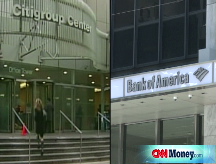Don't bet on bank nationalization
Investors can't seem to shake the notion the U.S. will seize control of a big bank. But experts don't think that's likely.
NEW YORK (CNNMoney.com) -- Nothing seems to scare bankers, or their shareholders for that matter, more than the word "nationalization."
Fears about the underlying health of banks have run so deep in recent days that there has been rampant speculation that the U.S. government may have to go so far as effectively seize control and manage one, if not more, of the country's largest financial institutions.
These worries sent bank stocks into their latest downward spiral Tuesday -- shares of some of the biggest banks, including Citigroup (C, Fortune 500), Bank of America (BAC, Fortune 500) and Wells Fargo (WFC, Fortune 500) fell by 20% or more.
Although shares of these and other banks bounced back sharply Wednesday, most big bank stocks are still trading well below where they began this year. Investors are concerned about the huge losses incurred by Citi and BofA and the rising amount of taxpayer money that the government is committing to support them.
Increasing signs that regulators in Britain may have to fully take over Royal Bank of Scotland also contributed to the recent nationalization fears in the U.S. Earlier this week, RBS (RBS) reported a loss of more than £20 billion ($30 billion) for 2008, the biggest loss in British corporate history.
Other European countries have moved to assume control of their financial institutions including Iceland and Ireland, which just last week took over Anglo Irish Bank on fears that it could collapse.
U.S. regulators, however, have been averse to the idea even though they have already pumped billions of dollars into banks and the broader financial system. But one expert notes there is a difference between government investments and government control.
"The key to nationalization is that the government actually owns and runs the institution, but so far that is not what they are doing," said James Barth, a professor at Auburn University who also serves as a senior finance fellow at the Milken Institute, a nonpartisan economic think tank. "The U.S. is a long way from that sort of model."
Of course, both Freddie Mac (FRE, Fortune 500) and Fannie Mae (FNM, Fortune 500) were effectively nationalized in early September when the government stepped in and placed the two mortgage buyers into conservatorship. But those two firms were already companies that had federal charters and were implicitly backed by the government.
Others might contend that AIG (AIG, Fortune 500) has also been nationalized. The government extended more than $150 billion in aid to the insurance giant since September.
However, even though the government does own a majority stake in AIG, the company's management team is still trying to sell assets in order to repay its loan.
Bank regulators, most notably Federal Deposit Insurance Corp. chief Sheila Bair, have downplayed speculation in recent weeks that a major bank may have to be nationalized.
Such an action would certainly prove costly for the government. But analysts warn that it would also wipe out common shareholders' existing stake and effectively close the door to private investors such as leveraged buyout firms and hedge funds.
Many believe these investors could be an integral source of capital in the months ahead as banks struggle with more troubled loans.
The government may also be wary of nationalization simply because it has hardly proven effective when other nations took over large financial institutions.
France did it in the 1980s, but those efforts failed miserably, prompting the government to take those banks private again. Some east Asian countries nationalized banks during that region's financial crisis in the late 1990s, but those banks soon devolved into inefficient state-run institutions.
"There have been state-owned banks that have mismanaged their risk so badly that they too have failed," said Gerard Caprio, a professor of economics at Williams College, who spent part of his career at the World Bank and Federal Reserve focusing on the financial sector.
There are other headaches that come attached with nationalizing a bank, including finding and appointing new management to run the company.
Some analysts wonder whether U.S. regulators could put a team in place that was even capable of running one large bank with massive global operations, let alone several of them.
Nonetheless, the government is expected to continue to take an increasing stake in some of the nation's biggest banks as the crisis drags on -- even if it stops short of full-blown nationalization.
The Treasury Department now owns about $90 billion of preferred shares and warrants in Citigroup and Bank of America, and some analysts fear that number could grow in the months ahead. Other banks may also need a second round of funding from the government as the U.S. economy sours.
To a large extent, the federal government has become one of the few remaining sources of capital for banks as private investors stay on the sidelines.
At the same time, banks' ability to raise money through a sale of common stock has dwindled alongside their falling stock price.
"When your stock is selling at very low levels it is an inefficient and ineffective way to raise common equity," said Gary Townsend, president of the Chevy Chase, Md.-based Hill-Townsend Capital. "Having to raise it in this environment is very punishing."
More government funds could be injected directly into banks via the second half of the government's $700 rescue package, but many industry observers are quick to point out that the Obama administration will take pains to limit its involvement.
"The goal is not to nationalize the private sector, but to facilitate getting everything back in the hands of the private sector," said Barth. "Everything is geared for the government to be involved on more or less a temporary basis." ![]()


